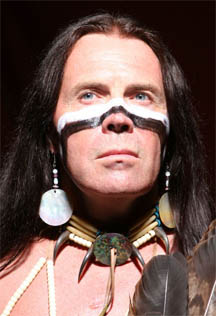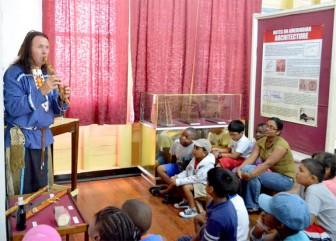Native American flautist Johnny ‘JJ’ Kent is trying to do his part to make the world a better place, preserve the cultural heritage of his people while also promoting harmony.
“One of the things I try to do through my music is try to help promote good feelings between all people. I want all people to realise that we’re all related to each other because we’re all family,” the Native American musician said in a recent interview with Stabroek News. He was in Guyana at the behest of the US Embassy here as part of its cultural programme.
Kent, who plays the flute and also sings, is a Native American Music Award-winning recording artiste and a cultural speaker and educator in schools and at University campuses in the US. He won “2009 Flutist of the Year” at the 2009 NAMMY Awards in Niagara Falls, Ontario. His visit to Guyana was his first to South America and he praised the beauty of the land and the hospitality of the people. Kent has travelled to Europe and he has also travelled extensively in the US, visiting colleges and universities to give presentations on the Lakota Indian culture and lecture on Lakota spiritual philosophy and also does storytelling and to play the flute.

“I always had a very strong interest in my culture. I wanted to be like my grandfathers and my uncles and my other elders that were traditional men because they were very well respected men in the community and that always very much impressed me. They were my role models and I wanted to be like them when I grew up, so part of that was learning the flute because it was a traditional instrument in my culture,” he said. Kent was born into the Muscovy Creek Indian nation but at age four, was adopted by a Lakota Indian woman and grew up in that culture in the Wind River Indian reservation in Wyoming.
As a boy, he developed a strong interest in country music and he taught himself to play the guitar and flute at a young age.
In a rapidly evolving modern world, Kent is seeking to educate people about traditional values that are at the core of the Native American culture but which are also being forgotten. He said that the message has been well received at the colleges and universities because people tend to be more educated and open minded at those places. “Hopefully I can make a difference in the world in some small way, I don’t expect to save the world all by myself,” he chuckled, adding that he feels a responsibility to make an effort to try to spread as much good feelings as he possibly can and music helps to do this.
He said that he is proud of heritage and the traditional values are good and he believes that they can be applied everywhere. It has to do with respect for each other as human beings, Kent said. “Our spiritual philosophy is not a religion, it’s a way of life and it’s based on seven principles that were brought to our people many, many years ago by a messenger from the Great Spirit that we call the White Buffalo Calf Woman,” he said.

The musician added that the spiritual truths can be found in all the world religions and spiritual philosophies. The principles are to walk quietly and be humble, have compassion for each other, love each other as relatives, be helpful to each other without waiting to be asked, have respect for all things in creation, walk with a good attitude for the sake of the children so they have good examples to learn from, practice forgiveness when someone says something to hurt your feelings or does an injustice to you, don’t hold on to bitterness or anger but forgive and just let it go as well as practice thanksgiving. While some practice these principles, others seem to have forgotten them, he observed.
Similar challenges
Kent said that he learnt a lot while in Guyana. “It’s been very surprising to me to find how many similarities we share in common,” he said. The musician visited two indigenous communities as part of his visit, including Surama in Region Nine, where he was able to observe how the residents lived.
“I found that the indigenous people here in Guyana share a lot of the same challenges that we face in the United States as native people in trying to hold on to our traditional culture and our ways, languages especially and its alarming and I feel very concerned about that,” he said. “They say that your language is your identity. If you lose your language, you lose your identity. So, I think it’s very important for our young people here to somehow feel inspired to learn their language so they don’t forget who they are,” he added. Remembering traditions can help the indigenous people to survive in the modern world and keep their identity, he said.
“Holding on to those traditional ways; that helps us to be proud of who we are, have that pride and also have our self esteem. We don’t have to feel like we’re inferior to any other race of people and if we feel proud of ourselves and we have that self-esteem, that way then that’s the tools that we can use to help us to have self-determination,” he said.
Kent pointed out that it has been difficult for native Americans in the US to hold on to their culture and there are tribes, particularly in the eastern US, that have completely lost all of their traditional ways, since they were the first to come under the influence of the Europeans. He said that while some native tribes have been able to assimilate into American society very well, the Lakota has had a difficult time doing so because for hundreds of years, they were a nomadic culture. “Because of the racism and things like that it’s still very difficult for native people to find jobs and things like that. It’s been a difficult transition,” he said.
Like in Guyana, he said that racial prejudice is experienced in the US. “Unfortunately, there is a lot of racial prejudice towards American Indian people in the western part of the United States. In the eastern part there is not so much. There was a lot of racism and prejudice in the 1950s and 1960’s between the white race and the black people but even that is mostly gone now but in the western part of the United Stated there is still a lot of racism between the white people and the Indian people,” he said.
“I still have a difficult time understanding why it still exists myself because I believe that all people should be able to see the dignity in all human beings. That was one thing my uncles always taught me, they always said if you take a knife and cut your finger, that is what colour you are and that is true for everyone of us and we are all created by the same Creator,” the musician declared. Growing up, he recalled that he experienced prejudice from both sides since he is not a full blooded Native American because his father was Caucasian. “A lot of the full-blooded Indian people hold a lot of anger and resentment towards the white man because of the way they were treated and the white man still holds a lot of racism and prejudice towards the Indian people because, for some reason, many of the white people still have attitudes of superiority and they still believe that everyone else that’s not white is not as good as they are and it’s just ignorance,” he observed.
Changing perceptions
Kent is trying to change the perceptions. He said that in recent years it has become a little bit easier but it is a very slow process. “There’s still a lot of myths and misconceptions that many non-Indian people have about our race, mostly because of things they’ve seen in the movies,” which portrayed Indians mostly in a bad way, he said.
One way of educating others “to have a better understanding of who we are instead of the Hollywood version” is through his music. His win at the 2009 NAMMY Awards was a proud moment, he recalled.
It was his third album and which was recorded as a tribute album to late wife, Cathy Gregory, who he lost in an automobile accident four years ago. “I wanted to record an album that would be a memorial in her honour, a tribute album to her,” he said. “I lost my wife which was a very sad thing but I wanted this album not to be so much about the sadness of losing her but to celebrate her life. She was a beautiful woman and she had such a kind heart especially for children, and so I wanted the world to know that I celebrate for her now because she’s at home with God and she’s in a beautiful place… and so for her I’m happy. I miss her very much but I also am very happy that she is now at home with God and her spirit is at rest,” he said.
The couple was married for 10 years. His wife’s Lakota name was Tate’ Topa Win, which means ‘Four Winds Woman’ and although it has a broad meaning, he said, it essentially means that “no matter which direction that she comes from, she always comes in a good way.” Her name was also the title of the album.
Kent said that he is fortunate in that his musical talent has opened doors and gives him the opportunity to travel to lots of places. “But I also feel a responsibility to use those gifts to try and help my people as much as I can,” he explained. Kent, 58, is a father of two daughters and one son and he also has three grandchildren.
He said that sharing his experiences has been rewarding. He initially started recording country music and had some success but was encouraged to record Native American music. “I have found a lot more success with my native music. I think it is something that the world is really searching for because there are many people in the world that are searching for spirituality,” he said.
He also speaks about domestic violence issues, as he said that while it was never part of traditional culture, nowadays because of problems with drugs and alcohol, it has become a serious problem and he wants to remind young native men that women are sacred. “In our belief, a woman is considered sacred. That’s because God, the Great Spirit has given the woman a power that us guys don’t have and that’s the power to carry that new life,” he said.




